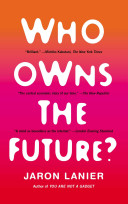Everything Won't Become Free at Once
Maybe the coolest technology could get very good and cheap, while at the same time crucial fundamentals for survival could become expensive. The calculi of digital utopias and man-made disasters don’t contradict each other. They can coexist. This is the heading of the darkest and funniest science fiction, such as the work of Philip K. Dick.
Basics like water and food could soar in cost even as intensely sophisticated gadgets, like automated nanorobotic heart surgeons, float about as dust in the air in case they are needed, sponsored by advertisers
Everything can’t become free at once, because the real world is messy. Software and networks are messy. And the sprawling miracle of information-animated technology rests on limited resources.
The illusion that everything is getting so cheap that it is practically free sets up the political and economic conditions for cartels exploiting whatever isn’t quite that way. When music is free, wireless bills get expensive, insanely so. You have to look at the whole system. No matter how petty a flaw might be in a utopia, that flaw is where the full fury of power seeking will be focused.
Notes:
The irony of society is that digital content is growing cheaper as is technology, but food and electricity are growing more expensive.
Folksonomies: technology automation utopia
Taxonomies:
/technology and computing (0.563356)
/society/social institution/divorce (0.408059)
/health and fitness/disorders (0.406666)
Keywords:
time crucial fundamentals (0.997377 (neutral:0.000000)), intensely sophisticated gadgets (0.956449 (positive:0.672734)), nanorobotic heart surgeons (0.955200 (positive:0.345943)), funniest science fiction (0.933852 (positive:0.718678)), Philip K. Dick (0.909580 (neutral:0.000000)), practically free sets (0.870721 (negative:-0.622384)), coolest technology (0.690401 (positive:0.279086)), digital utopias (0.678330 (negative:-0.788039)), n’t contradict (0.669300 (negative:-0.788039)), sprawling miracle (0.657786 (positive:0.767370)), digital content (0.657750 (positive:0.308300)), man-made disasters (0.650311 (negative:-0.788039)), real world (0.633109 (negative:-0.437688)), wireless bills (0.618531 (negative:-0.513220)), economic conditions (0.602662 (negative:-0.622384)), information-animated technology (0.598722 (positive:0.767370)), flaw (0.458894 (negative:-0.719813)), food (0.415675 (positive:0.354501)), calculi (0.402882 (negative:-0.788039)), irony (0.394865 (positive:0.308300)), cartels (0.391714 (negative:-0.622384)), heading (0.380125 (positive:0.718678)), advertisers (0.372258 (positive:0.221874)), float (0.368035 (neutral:0.000000)), electricity (0.367032 (negative:-0.318233)), fury (0.364831 (negative:-0.709730)), illusion (0.363761 (negative:-0.622384)), survival (0.362767 (neutral:0.000000)), society (0.362459 (positive:0.308300)), dust (0.357970 (neutral:0.000000))
Entities:
Philip K. Dick:Person (0.875831 (neutral:0.000000)), calculi:HealthCondition (0.826063 (negative:-0.788039))
Concepts:
Philip K. Dick (0.939728): website | dbpedia | freebase | opencyc | yago
The Man in the High Castle (0.694700): dbpedia | freebase | yago
Science fiction (0.669167): dbpedia | freebase
Advertising (0.627273): dbpedia | freebase | opencyc
Utopia (0.612516): dbpedia | freebase
Economics (0.594733): dbpedia | freebase | opencyc
2000 albums (0.565431): dbpedia
Cost (0.558804): dbpedia | freebase | opencyc





